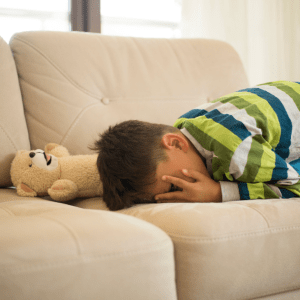Here’s a parenting question I get often: Should I condemn or condone quitting an activity? I was fortunate enough to have this exact conversation with Jen Zamzow, PhD for her Good Housekeeping article “It’s Okay to Let Kids Quit Things.” And this is what we discussed…
 It’s Okay to Let Kids Quit Things
It’s Okay to Let Kids Quit Things
“Q: When one of my kids was in kindergarten, he spent months begging to learn karate. When we finally signed him up, he wanted to quit after two classes. My husband and I were at a loss. Do we let him give up or push him to keep trying? we asked ourselves. And how will our decision affect him in the future?
A: In an age of intensive parenting with an emphasis on building resilience and antifragility in kids, it’s easy to panic when they want to quit something. If we let them start and stop on a whim, how will they ever learn to see things through, especially when the going gets hard?”
Good question. Read the full article HERE.
Related Articles:








 Q. My son is 11 and an only child. His first reaction to everything is negative, a sigh, makes a face and moans. This is the reaction to every meal (even stuff he likes), an outing he likes or even just being asked to watch tv with us. When we try to do fun family stuff he moans. Nearly every time he enjoys the activity and tells us afterwards, when we ask, that he loved it. He just wants to be playing on his iPad or watching TV on his own in his room. He says these activities take time from his gaming. I get frustrated because I plan these family activities around what he likes to do and yet he moans about going. Then it causes a row because no matter what we do he never gets excited or happy.
Q. My son is 11 and an only child. His first reaction to everything is negative, a sigh, makes a face and moans. This is the reaction to every meal (even stuff he likes), an outing he likes or even just being asked to watch tv with us. When we try to do fun family stuff he moans. Nearly every time he enjoys the activity and tells us afterwards, when we ask, that he loved it. He just wants to be playing on his iPad or watching TV on his own in his room. He says these activities take time from his gaming. I get frustrated because I plan these family activities around what he likes to do and yet he moans about going. Then it causes a row because no matter what we do he never gets excited or happy.
 This month, Bonnie has invited guest writer, Abi Long, to offer her traveling insights for families.
This month, Bonnie has invited guest writer, Abi Long, to offer her traveling insights for families.


 I hate the word chores, and I can guarantee your kids do too. Asking kids to do chores is like saying I want you to take on this drudgery, this burden. And then when the expectation is that they should do them willingly because of all you do for them—that’s a catastrophe waiting to happen.
I hate the word chores, and I can guarantee your kids do too. Asking kids to do chores is like saying I want you to take on this drudgery, this burden. And then when the expectation is that they should do them willingly because of all you do for them—that’s a catastrophe waiting to happen. Third, set your expectations of yourself appropriately. Expect that from a very young age, your children are going to do tasks to be helpful. Just don’t expect
Third, set your expectations of yourself appropriately. Expect that from a very young age, your children are going to do tasks to be helpful. Just don’t expect 
 This summer, especially following this Covid-fraught school year, I want to revisit my Be more, teach less philosophy. Kids love summer. It’s a time to be laid back and let go of all the tension around schoolwork and grades. And this year especially, after the stress of remote learning, very little socializing, everyone home on each other’s back, a good deal of simply being is called for.
This summer, especially following this Covid-fraught school year, I want to revisit my Be more, teach less philosophy. Kids love summer. It’s a time to be laid back and let go of all the tension around schoolwork and grades. And this year especially, after the stress of remote learning, very little socializing, everyone home on each other’s back, a good deal of simply being is called for. Q. My son is 15 years old, so that means I shouldn’t tell him what to do, right? We have a pool, and I’d rather he swim than play video games. He prefers the latter. He seems to be all done with pool games as are his friends. When they come over, they sit with their feet in the pool and wait for their required outdoor time to end so they can go inside and play video games. Although I’ve adopted a pretty good ability to not be controlling, I’m finding it harder to apply this to my 15 year old than my older son. He wasn’t as much of a video game kid. Neither of them have been outdoor kids and I guess I have to finally get over it. Any thoughts or comments?
Q. My son is 15 years old, so that means I shouldn’t tell him what to do, right? We have a pool, and I’d rather he swim than play video games. He prefers the latter. He seems to be all done with pool games as are his friends. When they come over, they sit with their feet in the pool and wait for their required outdoor time to end so they can go inside and play video games. Although I’ve adopted a pretty good ability to not be controlling, I’m finding it harder to apply this to my 15 year old than my older son. He wasn’t as much of a video game kid. Neither of them have been outdoor kids and I guess I have to finally get over it. Any thoughts or comments?